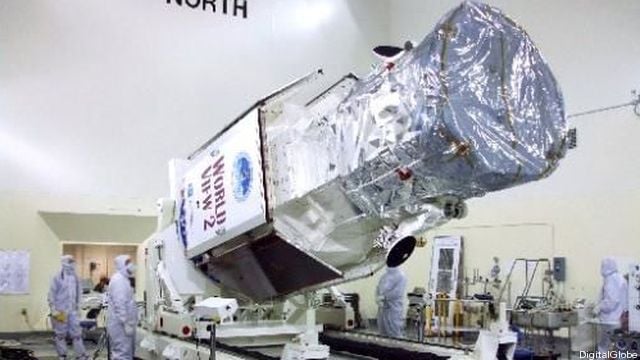 Only one company is likely to survive the coming budget intelligence community budget cuts to commercial imagery purchases. Both GeoEye and DigitalGlobe appear to believe they will be the victor, opening the door on what could become a damaging contest for control of the U.S. commercial imagery market.
Only one company is likely to survive the coming budget intelligence community budget cuts to commercial imagery purchases. Both GeoEye and DigitalGlobe appear to believe they will be the victor, opening the door on what could become a damaging contest for control of the U.S. commercial imagery market.
DigitalGlobe, a company that says nothing publicly as much as possible, offered a bold rejection of GeoEye’s offer on Sunday. Their board of directors looked at GeoEye’s bid and “unanimously” rejected it. The company said “it substantially undervalues the Company in relation to DigitalGlobe’s standalone business and financial prospects” and “does not adequately recognize DigitalGlobe’s superior track record of financial and operating performance as well as its constellation’s greater capabilities.”
We’ll leave it to those who use their services to judge which company boasts the best array of satellites and services. But both companies face one incontrovertible fact: The amount of money flowing to them will begin dropping when the government’s next fiscal year begins in October as a result of deep budget cuts to the National Geospatial Intelligence Agency.
If either company wants to build another satellite to improve its products and ensure it doesn’t lose coverage, then one of the companies will almost certainly have to fall into the embrace of the other. Deploying a new satellite will almost certainly cost more than half a billion dollars and the capital markets are unlikely to lend either company that kind of money in an increasingly constrained fiscal environment. Of course, a new crisis somewhere in the world could put both companies back in the game, but it’s hard to plan with that in mind.
DigitialGlobe disclosed in its statement that last week’s offer from GeoEye was not the first, though it was the only public offer. GeoEye made its first offer one week before the defense budget was released, on Feb. 7. DigitalGlobe says it thinks those earlier offers “were motivated by GeoEye’s concerns with the disproportionate risks of government budgets cuts affecting its business.”
For its part, DigitalGlobe “rejected those proposals, but was willing to discuss DigitalGlobe acquiring GeoEye, and proposed a transaction under which DigitalGlobe’s stockholders would own approximately 60% and GeoEye stockholders would own approximately 40% of the combined company, with DigitalGlobe’s Chairman and Chief Executive Officer continuing in their respective leadership roles.” But that offer was dropped because DigitalGlobe “believed that the U.S. Government process would be favorable to DigitalGlobe, and that protracted discussions would be disruptive to the U.S. government in its decision-making process as well as create needless distraction to ongoing mission performance.”
How worried does DigitalGlobe think GeoEye is? DigitalGlobe’s CEO Jeffrey Tarr put it this way:
Given the abruptness of GeoEye’s most recent proposal and the companies’ past discussions, we believe GeoEye made its hostile bid in desperation due to highly publicized concerns about potential government decisions that may jeopardize their portion of the EnhancedView program.
Tarr went on to boast that only DigitalGlobe has a “constellation of three healthy on-orbit high resolution satellites, which allows us to deliver vastly more imagery to NGA than GeoEye, both in total and per-taxpayer dollar, generating significant value for the government and taxpayers.” His company, he made clear, thinks it is in the best position to ride out the coming cuts.
How much of all this is posturing — something that both companies have done a great deal of during their lifetimes — and how much is driven by data and intelligence gathered from Congress, Wall Street and the upper reaches of the intelligence community is hard to judge at this point.
What does seem certain is that these two companies will deploy lawyers, consultants and their executives — as well as friends on Capitol Hill and in the Pentagon — to help convince investors that only they can and should be America’s one commercial spy satellite imagery company. Let loose the dogs of finance!
Air Force picks Anduril, General Atomics for next round of CCA work
The two vendors emerged successful from an original pool of five and are expected to carry their drone designs through a prototyping phase that will build and test aircraft.


























